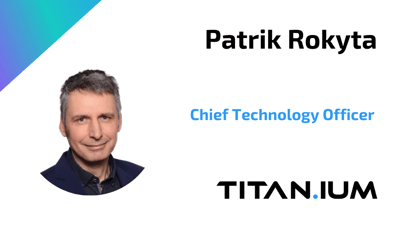The Mobile Europe "Network NOW" event held on December 6, 2023, at the Cavendish Conference Centre in London, brought together top telecom and ISP executives from Telefonica, Vodafone, BT, Orange, Liberty Global, Altice and Vorboss. Sponsored by industry leaders like Celfocus, Titan.ium Platform, Red Hat, and powered by knowledge insights from Google, the event delved into the pivotal intersection of network transformation and evolution, artificial intelligence (AI), and the customer experience.
The day commenced with an insightful panel discussion on the role of cloud in AIOps. Experts, including Yuvraj Tandon from Vodafone, Neil McRae from Juniper Networks, and Matthew Twomey from Anritsu, explored the enhancing role of automation in managing increasingly complex services. The consensus: Cloud's unparalleled compute power supports big data, analytics, and AI for enhanced automation, paving the way for a better customer experience.
Enrique Blanco, Group CTIO of Telefonica, delivered a compelling opening keynote on the unprecedented transformation of telecom networks. He highlighted the importance of FTTH and 5G, discussed the technological levers for the radical transformation of networks and systems, and emphasized the significance of the Open-RAN architecture in conjunction with the next generation of the mobile network, AKA 6G.
The event also shed light on practical applications of generative AI in telecom operations, with Carla Penedo and João Antunes from Celfocus providing real-world insights, and with Fredric Sundin from Vodafone exploring the evolving attitudes towards automated networks. A panel discussion featuring industry experts such as Jen Hawes-Hewitt from Google and Adaora Okeleke from Analysys Mason addressed the critical role of data in network automation. The conversation centered on scaling dependable data and its significance in leveraging AI.
Colin Bannon, CTO of BT Business, outlined what operators can do to seize opportunities in the Network as a Service (NaaS) market, emphasizing the potential for significant revenues from new services. In the subsequent panel discussion, he explored, together with Fredric Sundin from Vodafone and Beatriz Ortega from Red Hat, how network and service automation are fundamentally changing the telco business, aligning with the theme of digital transformation.
Timothy Creswick, Founder and CEO of Vorboss, engaged in a conversation about the challenges and advantages of building a vertically integrated telecommunications company. A concluding panel featuring Fredric Sundin from Vodafone, Sana Ben Jemaa from Orange, and Kirsty Bright from Liberty Global discussed the desired balance between efficiency and innovation in AI-enabled networks, and the challenges in translating the telco language into the AI language and vice versa.
As the event concluded with insights from Jose Pedro Nascimento, CTO of Altice Portugal, on completing the crucial triangle of network, AI and customer experience, and how important the combination of real-time insights and AI is for preventive maintenance, attendees left with a clearer understanding of the industry's challenges and opportunities.
The "Network NOW" event proved to be a melting pot of ideas, insights, and innovations, setting the stage for the telecom industry's future where technology not only connects but transforms the way we live and communicate.
Titan.ium Platform: Platinum Sponsor and Industry Pioneer
Titan.ium Platform, the platinum sponsor of the Mobile Europe "Network NOW" event, took center stage with a presentation by its CTO, Patrik Rokyta, focusing on the role of the 5G Security Edge Protection Proxy (SEPP) in the delivery of 5G standalone roaming services.
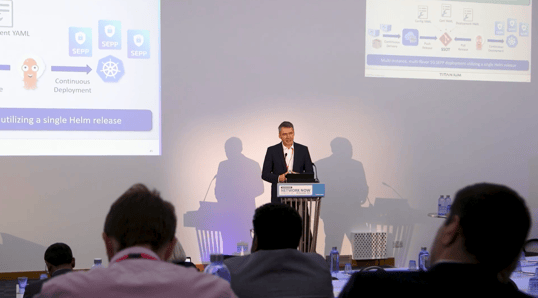
The CTO emphasized the importance of secure and reliable 5G standalone network interconnects and how the Titan.ium’s cloud-native platform and the 5G Security Edge Protection Proxy can effectively help the mobile network operators manage the tradeoffs between security, operations and business concerns, showcasing the SEPP deployment with Deutsche Telekom Global Carrier.
Today, the non-standalone 5G deployments dominate the market by delivering more and faster data over 5G new radio. But to introduce services beyond the enhanced mobile broadband (eMBB) and fixed wireless access (FWA), and to successfully compete in the continuously evolving landscape of the next generation networks, the mobile network operators will sooner or later transition their network and workforce to cloud-native and the 5G standalone model. With this, they become more responsive to the market demands, improve the operational efficiency, and open new revenue streams, for example by selling 5G standalone services to verticals.
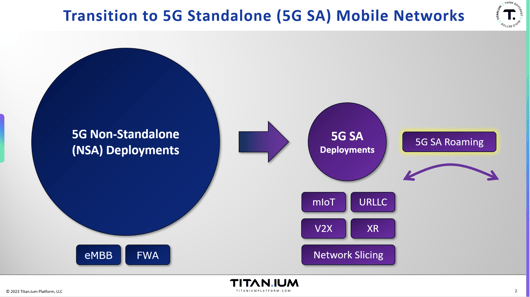
5G standalone roaming makes the 5G standalone services continuously available to users and devices around the globe. At the same time, the 5G standalone roaming provides for a significantly higher security than the legacy roaming services. And this is where the 5G Security Edge Protection Proxy comes into play. The 5G Security Edge Protection Proxy effectively safeguards the IP interconnect communications against fraudulent network access and message content spoofing and so encourages an increased usage of 5G standalone services and the monetization of these services in roaming scenarios.
The trick is that mastering 5G security requires in-house security-knowledge and toolsets to identify and mitigate signaling threats. Also, managing hundreds of 5G interconnect agreements may not be something the mobile network operators want to do themselves. The innovative capabilities of the Titan.ium’s 5G Security Edge Protection Proxy stand out in its support for multiple deployment models, empowering trusted IP interconnect service providers to function as a 5G standalone roaming partner for mobile network operators, whether or not SEPP is integrated into their 5G core. The following deployment models are feasible:
- Outsourced SEPP: In this model, the mobile network operator lacks SEPP service capability in its 5G core network and delegates this function to the trusted IP interconnect service provider of operator’s choice.
- Hosted SEPP: Here, the mobile network operator possesses SEPP service capability in its 5G core network but opts not to manage any or selected bilateral trust agreements with its roaming partners directly. Instead, the mobile network operator interconnects its SEPP with the SEPP deployed at the trusted IP interconnect service provider.
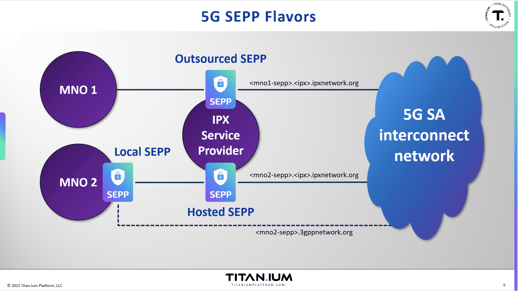
It's noteworthy that Titan.ium’s 5G Security Edge Protection Proxy can also be configured to act as a local SEPP deployed in the 5G core of the mobile network operator, delivering the same level of protection and services as when outsourced or hosted with a trusted IP interconnect service provider. This flexibility affords the mobile network operator the choice to directly interconnect with selected roaming partners while simultaneously engaging a trusted IP interconnect partner in communications with other roaming partners.
Another distinctive feature of Titan.ium’s 5G Security Edge Protection Proxy is its ability to screen any parameter in received messages and modify their content. This capability enables firewalling services, safeguarding roaming partners from fraudulent network access and ensuring seamless interoperability among partners using products that may face challenges in successfully establishing and delivering 5G standalone roaming services. This dual functionality enhances the security and flexibility of the Titan.ium’s SEPP, making it a versatile and reliable solution in the emerging 5G standalone roaming and 5G standalone network interconnect markets.
Robust security and operational efficiency are crucial in the successful delivery of 5G standalone roaming services. Titan.ium’s 5G Security Edge Protection Proxy ensures interoperability by strictly adhering to 3GPP standards and by undergoing rigorous module and systems tests. As a cloud-native implementation, Titan.ium’s SEPP leverages the inherent robustness and resiliency of the underlying container orchestration platform. Comprising of individual components (containers) deployed across distributed compute nodes, each component is continuously screened for its liveness and readiness ensuring that the communication service is always delivered at required resiliency level. Self-healing, auto-scaling, canary roll-outs and rolling updates enhance the operational experience driven by fully automated rollouts leveraging GitOps and continuous deployment best practices.
The transformation to cloud-native is an exciting journey that happens at different speeds across the telco industry and among the communications service providers and their vendors. Titan.ium Platform has its signaling, routing and security product portfolio ready to address both the existing and the future requirements of the telecommunication market and is happy to see that the capabilities of its cloud-native products, both from the functional and operational perspective, resonate across the customer base. At the same time, Titan.ium continues to reliably support customers that still utilize physical or virtualized infrastructures.
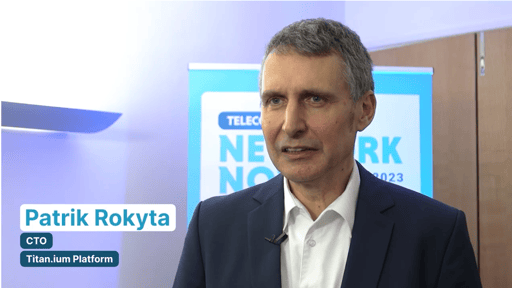
In an interview with Michelle Donegan from Mobile Europe, Patrik Rokyta discussed the changes over the past year within the business and the transition to cloud-native and 5G standalone networks and services, and how Titan.ium Platform has assisted its clients. Mastering the journey together is the key message here.
